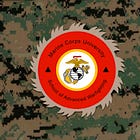
Earlier this week, my favorite Martian posted a piece that claimed ‘AI is doing to the universities what Gutenberg did to the monasteries’. In the course of doing this, John Carter painted a picture of a very near future in which large language models serve as private tutors, tailoring programs of instruction interaction to the needs, abilities, and tastes of individual learners.
In keeping with the name of this newsletter, I soon found myself thinking of ways to use silicon Socrateses of this sort in the military realm.1 That is, andragogic automatons built to liberate undergraduates from monotonal monologues can also free soldiers, sailors, airmen, and Marines from the pain of the ‘words on the wall’ PowerPoint presentation and the tyranny of the terminal learning objective. In doing so, moreover, they can correct a major glitch in the current approach to ‘professional military education’.
In the armed forces of the United States, the high cost of sending service people to multi-month residential courses has created a two-tier system. Some students attend such schools on a full-time basis. That is, for the duration of matriculation, the only duties they perform are those directly linked to the course in question. All others, however, must complete such schooling on their own time.
Orders to attend brick-and-mortar schools come from the same bureaucracies that hand out assignments of other sorts. As might be expected, these base their decisions on the need to place the right combinations of rank and speciality in particular jobs at particular times. In other words, whether or not an officer obtains at place at a residential course has little to do with his ability to exploit the experience for the benefit of the Service.
Providing all hands with AI tutors will eliminate the lopsided character of the current system of professional military education. At the same time, it will create a degree of dependence familiar to all who have come to rely upon such aids to navigation as Ways and Google Maps. After all, in a world as rich in change as our own, the most important form of learning is that which takes place on the battlefield.
Yes, Virginia. I do, indeed, know that the proper plural of ‘Socrates’ is ‘Socrates’.







AI like computers is a marvelous tool.
It’s a great step change for using or interfacing with MACHINES.
For us? Basic instruction yes, intermediate no.
Never mind advanced.
I fix networks.
AI - write me a script to log and capture errors
Done in a flash.
AI - something advanced; No
AI a creative solution- no.
I would like to think that a practical approach and application might be to teach intelligence analysis models or geopolitical models. Maybe even Primary function matrix for scenarios of action- reaction- counteraction. Clausewitz tells us in Book I, chapter 8, pp 122-142 that no general can accustom an army to war. I can’t help but think what the outcome would look like if war planners for the rainbow plans would have been able to run computational and AI scenarios? I also wonder how deep would knowledge retention be? Recall? How about something more complex like Balance of power scenarios? Insurgency assessments? And considering that Foreign Affairs journal and the Military Strategy Journal have published recent articles on how a commander might prepare now for a coming civil war, how useful would AI be to a commander? Especially if it could immediately sort out the cultural, political and social grievances quickly before a commander made a decision. I really think they should think about training AI for Geopolitical and Geoeconomic analysis. Damn- results could be updated quickly